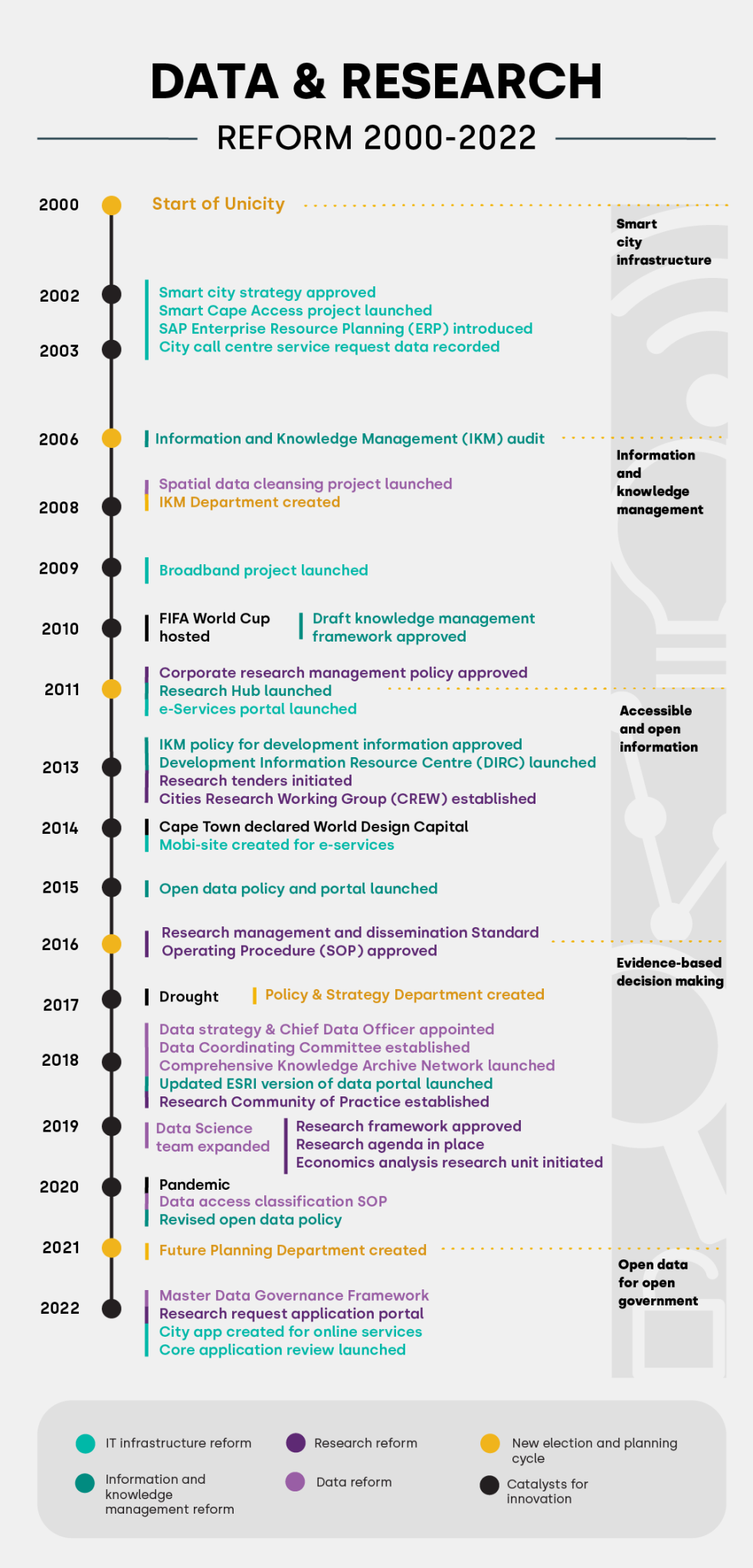
Data and research as key enablers of city outcomes: A case study of the City of Cape Town (2000-2022)
This case study explores the evolution of using data and research, enabled by technology, to improve outcomes in the City of Cape Town (CCT) in South Africa.
-
Wright et al Case Study January 2023.pdf
PDF document • 8.94 MB
Smart cities and evidence-based decision-making have become increasingly popular narratives in the information age, with city councils around the world looking to make use of data and research to improve the delivery of services and make more informed decisions. Together, they can improve efficiency, resource allocation, and project evaluation. However, investments in such reforms can also be expensive, and cities need to ensure these reforms are fit for purpose.
This case study explores the evolution of using data and research, enabled by technology, to improve outcomes in a city that has taken a pragmatic approach in this regard: the City of Cape Town (CCT) in South Africa. Figure 1 below outlines the size, income levels and the integrated structure of the City.
The story begins at the start of the City’s official journey in 2000, when 7 disparate municipalities were merged into one ‘unicity’ (shown in Figure 1), and follows significant reforms that have enabled the improved use of data and research to achieve city outcomes over a 20-year period.
A timeline of the various CCT reforms on data and research, and associated IT infrastructure and information and knowledge management approaches, is displayed in below. The timeline also highlights the 5-year election and Integrated Development Planning (IDP) cycles, as well as the broad contextual changes occurring at the time, that often played a large role in catalysing certain projects or reforms. These include the global policy narratives around smart cities and the knowledge economy in the early 2000s; the 2010 FIFA World Cup; the City being named the World Design Capital in 2014; and then two crisis events: the 2017 drought, and the COVID-19 pandemic.

Timeline of data and research reform in the City of Cape Town (2000-2022).
The reforms are grouped into ‘eras’, loosely following the structure of the case study.
Section 1 of the case study explores how the City built the Information and Technology (IT) infrastructure for improved administration and service delivery. This was the primary focus of the first few years after the UniCity was established, and enabled the generation of vast quantities of data and information in a digital format.
Section 2 covers the reforms to centralise, share and better manage information - including data and research - through establishing an Information and Knowledge Management (IKM) department. In the earlier part of this era, the focus was largely on consolidating and centralising information internally. But as time passed, this shifted to a more holistic and integrated approach, looking to share the City’s information more broadly with the public, and also to better manage, leverage, and apply the research and data work being done externally to the City.
Section 3 then looks at how data and research are being used to guide decision making, spurred on by the organisational transformation at the time, which emphasised the role of evidence-based decision-making, valuing data as an economic asset, and the creation of more transversal policies in the City. A new era is now emerging on ‘Open Government’, to ensure citizens are better included in the generation of evidence and feeding into decisions.
The key lessons for other cities are detailed in the final section, and include:
- Don’t let technology drive your business.
- Pro-actively monitor and adapt to the rapidly changing technology landscape.
- Invest in a variety of in-house capabilities – not only to support data, research and technology initiatives, but also to hold service providers to account.
- Ensure all systems and their data are designed for integration and sharing from the outset.
- Data, research, and IKM should be embedded as key roles and activities in supporting service delivery and infrastructure investments
- Leverage moments of change to advance innovation, and make sure to institutionalise successes across the organisation.
- Understand the ‘digital divide’ in your city.





